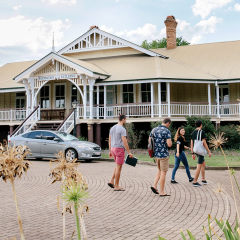Planning for your day, week, month or semester might seem like a lot, but it will help you find balance in your personal life, studies and social life. It can be easy to forget that university is like a job. At UQ, 10 hours a week for contact time and studying is recommended for every 2-unit course. Depending on whether you are doing part-time or full-time studies, you could find yourself spending up to 40 hours per week on studying, and this excludes time spent on your wellbeing, extracurricular activities, sleep, and even work.
Here are 4 essential planning tips for a balanced and successful semester ahead:
1. Set clear goals
It is never too late to set clear and achievable goals for yourself. Having specific goals is essential to guide your planning efforts and will help you assess your progress throughout the semester. This can also apply to other aspects of your life, from your relationships with friends, family or other loved ones, to physical health and wellbeing.
2. Create a semester schedule
Incorporate your course timetables into your personal schedule to create an overview of your week, month and semester. There are countless digital tools and apps to help you with task management (i.e. Notion, Todoist, Google Calendar to name a few), along with YouTube videos about other time and task management apps that can help you with effectively planning for a university semester. See how you can download and use the Semester Planner created by the Learning Advisers.
3. Prioritise tasks
Assignments, exams and projects are inevitable and it can become overwhelming trying to figure out which one you should tackle first. Identify and prioritise your tasks based on the deadlines and importance. Task management apps can help you with categorising tasks by how urgent and/or important they are. Breaking your assignment or study reviews down into smaller and more manageable tasks will help you manage and monitor your progress as well.
4. Practice self-care
Making time for your physical, mental and emotional health is key to long-term and sustainable academic success and your wellbeing as a whole. Remember to allocate time for activities like exercise, socialising and for things you love. There are many ways you can practice self-care, and everyone will have self-care practices that are unique to themselves and their lifestyles.
There are many more planning strategies to not only allow you to achieve academic success, but also maintain your health and overall wellbeing. You can explore the suite of Wellbeing Programs that are run by the UQ Counsellors, or get academic support and help from the Learning Advisers. Mindful planning and pacing yourself can help you turn challenges into opportunities for growth. Make the most of your university experience, and most importantly, enjoy yourself on this journey.
Below are more resources and information you can access for:



